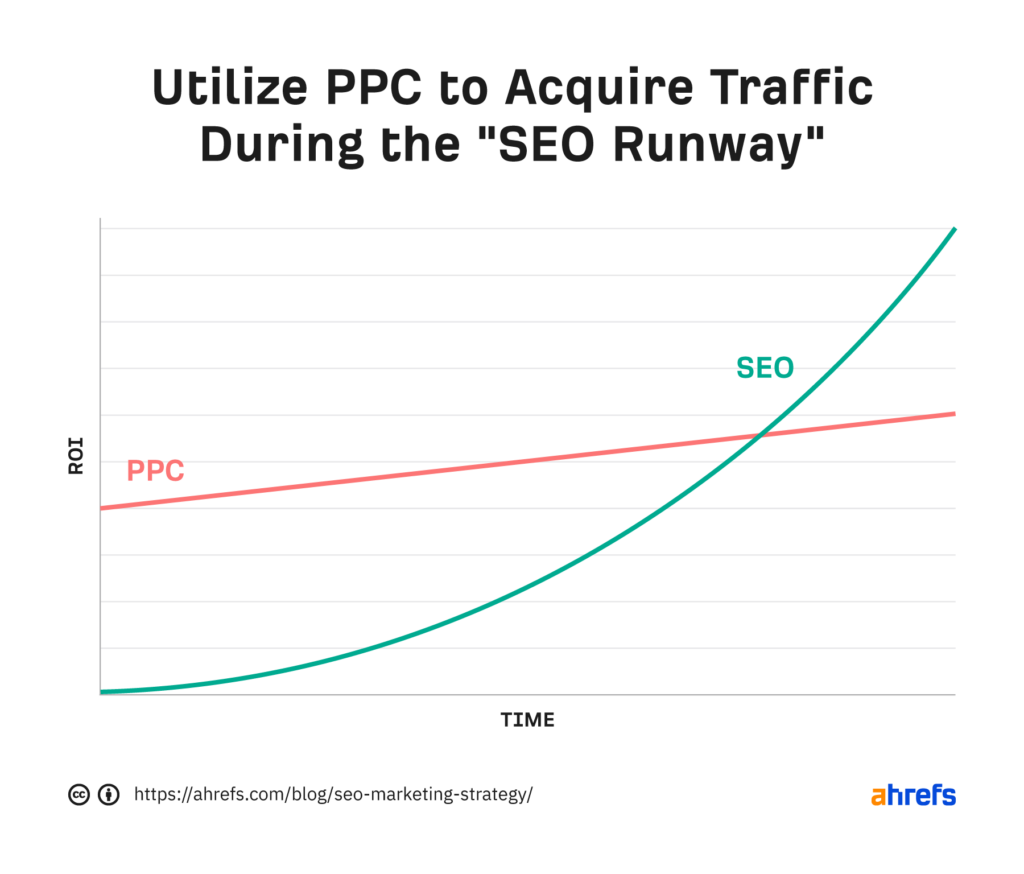If you’re responsible for your organisation’s marketing budget, then you’re undoubtedly experiencing a heavy weight on your shoulders. You need to be able to demonstrate growth and revenue – and, above all, an ROI. And in marketing budgets, as with any budget, you’ll have to make tough decisions.
So your task is finding the right channels to focus your budget on to yield the best results. In a fast-paced landscape flush with options and acronyms, is SEO important? And what role does it play in your digital marketing strategy?
Spoiler: it’s important, and it does work. But don’t just take our word for it – the good folks at Ahrefs have put together a pretty compelling list of SEO stats, including the fact that 68% of all online experiences begin with a search engine. If this is true for your audience, can you afford not to allocate a budget to SEO?
SEO: why it’s the ace up your sleeve
SEO is not a magic bullet. Think of it more as the ace in your deck – a strategic card you can play to clinch a winning hand (or two). Added to your marketing mix, it’s another channel you can leverage to generate multiple touchpoints across a buyer’s journey, which might include PPC, social media and content marketing.
It’s true that SEO is a long-term play. However, its magic lies in its often-underestimated ability to influence and unify other marketing channels, paving the way for a more cohesive and potent marketing strategy.
Let’s take a closer look at how you can weave SEO into your marketing mix for enhanced growth and ROI from my perspective as an SEO professional with a digital marketing and PR background. Why? Because I’ve seen it work from all sides.
SEO and content marketing: why they’re better together
The synergy between SEO and content marketing is pretty powerful. It’s the reason you see content marketing firms tout their SEO expertise, while SEO agencies emphasise the value of well-crafted content to drive organic traffic.
“Content and SEO. At their best, they form a bond that can catapult any website to the top of search engine rankings. But that’s only when they’re at their best. Because, when they’re at their worst, they can cause Google penalties that are near impossible to recover from.”
Can you have a content marketing program without SEO? Of course you can. But if organic visibility is a key objective of your overall marketing strategy, I’d suggest you add it in.
From a strategic level, SEO-guided content complements your marketing efforts by:
- Building brand awareness
- Improving your brand’s credibility
- Attracting more people at each point in the user journey
- Nurturing and converting leads
On a more operational or tactical level, SEO support helps your content marketing by:
- Identifying topics to cover
- Analysing what content generates competitor traffic
- Developing SEO-led content briefs (think keywords, search intent and SERP analysis)
- Reviewing and assessing content for refreshing
SEO and Google Ads: why they’re a power duo
When you’re looking to improve your search visibility and drive growth, you have options. Paid and organic. Google Ads and SEO. But this is not, and should not be, a one or the other situation. After all, we’re talking about the same SERPs – it’s just different positions on the same page.
If you need short-term visibility, Google Ads will help you achieve that. You might even choose to take this approach until your organic visibility improves. Later, you might allocate your paid search budget to terms that you can’t break into organically.

But SEO is more than just finding that balance between paid results and organic results – it can also inform your paid search campaigns. Your SEO agency will perform a competitive analysis and keyword research to identify your weaknesses and opportunities. This process will uncover a few nuggets, including:
- terms that generate traffic to your competitors
- related terms you may not have considered for paid
- what the user is looking for.
Organic results provide insight into what the searcher is actually looking for, which provides you with insight to improve your paid strategy.
And on the flip side, paid search can inform your SEO. In keyword research, finding a clear target is not always straightforward, and getting agreement from various stakeholders can be challenging. Paid Search is a great way to deliver significant traffic to test out the efficacy of those different search targets to identify which generates quality leads.
SEO and social media: a collaborative approach
There has always been debate around social media’s influence on SEO.
Are social signals a ranking factor for Google?
In 2015, John Mueller, a search advocate at Google, said that social signals do not directly help in organic rankings. In fact, the team at Google has consistently denied it.
But for many in the industry, the belief is that there is some indirect influence on search performance. After all, social media can amplify content, which, in turn, generates mentions and links online.
But can SEO help influence your social media performance? Absolutely. If you want to grow your Twitter or TikTok following, then you must consider all opportunities for exposure.
The first is on the specific platforms, where you can take an SEO approach to optimising your opportunity. For example, in Australia, 350 people per month search for either ‘youtube seo’, ‘tiktok seo’ or ‘instagram seo’ to improve their visibility.
And, yes, there are people searching for and finding social content on Google. If you want to improve your chances of being visible in this scenario, then you need to have an SEO strategy.
PR & SEO: an underestimated bond
Like social, the conversation about PR and SEO is traditionally around how PR can help influence SEO. PR generates backlinks and branded search terms, which both influence your organic traffic.
But can SEO help your PR performance?
Let’s first start with the objective of PR, admirably defined by Adrian Falk, Director of Believe Advertising & PR: “The main objectives of PR are to create awareness, build credibility, maintain relationships, and influence the public’s attitude towards their brand or organisation.”
Aside from maintaining relationships, SEO can assist PR in achieving its primary objectives. Achieving prominence in search results increases awareness, builds credibility and can play a small role in influencing the public’s attitude toward the brand or organisation.
But let’s dig in a little more.
If your PR budget is looking to influence the public’s attitude toward your brand, then would it help to understand what they are searching for? And their intent when they do?
An SEO who has finely tuned their keyword research knowledge over many years can support you in identifying the topics that influence your audience to craft more compelling campaigns.
And what about understanding the impact of your PR campaign on brand awareness? Are you already monitoring the volume of branded search impressions and clicks? An SEO professional would be – and they can help you to report any movement and its influence.
Here’s a PR/SEO play by one of the biggest names in entertainment…
A PR Masterclasses 🤌
Taylor Swift attended the Jets game as a strategic SEO play to bury her jet emissions stories. 🤯
Genius. pic.twitter.com/tITIketCgR
— Britney Muller 🇺🇦 (@BritneyMuller) October 3, 2023
A good SEO will champion user experience (UX)
Do you have an in-house UX designer? What about someone who is laser-focused on conversion rates and page experience? Your SEO agency will (or should).
We fight tooth and nail for organic growth and want to be accountable for real business KPIs and ROI. So we want to work with you to improve conversion rates.
But, more than that, user experience can be a determining ranking factor. Consider the factors that are confirmed ranking signals.
You can see how the SEO agenda aligns with user experience.
SEOs will inevitably lead the charge for your website to improve:
- Site navigation. This is important to ensure search engines crawl your site efficiently and valuable areas of your site are not lost.
- Layouts. You can bet your SEO will have a say on your home page sliders, pop-ups and other page layouts that distract people from viewing the content they came to view. Because even if the user metrics are simply indirect indicators to Google, we don’t want people going back to the search engine to find another result.
- Accessibility. We care about accessibility because we don’t want to leave users with slower internet connections or low vision behind – and neither does Google.
- Content Design. Content design is a big one because we care about whether the content we’re championing gets read and encourages a user to navigate further into the website.
In the constantly evolving landscape of digital marketing, SEO emerges not just as a strategy but as a cornerstone for sustainable growth.
During turbulent periods when budgets come under scrutiny, a focus on SEO ensures a steady stream of leads, safeguarding the vitality of your business from fluctuating market dynamics.
Beyond the realm of rankings and organic traffic, SEO professionals delve deep into the psyche of the target audience, offering invaluable insights into trending search terms and evolving consumer preferences. This wealth of knowledge is not just a tool but a visionary lens through which new business opportunities, product lines and expansion horizons can be identified and capitalised upon.
And you don’t need to take my word for it. The State of Marketing Report 2023 revealed that a striking 88% of marketers are planning to maintain or increase their SEO investment. Further proof that SEO transcends mere rankings – it isn’t just a strategy but a vital driver of steady growth. And that’s worth investing in.

